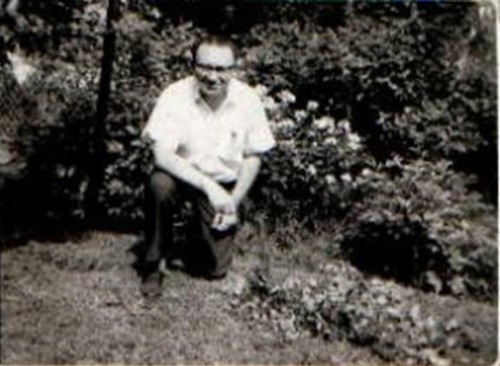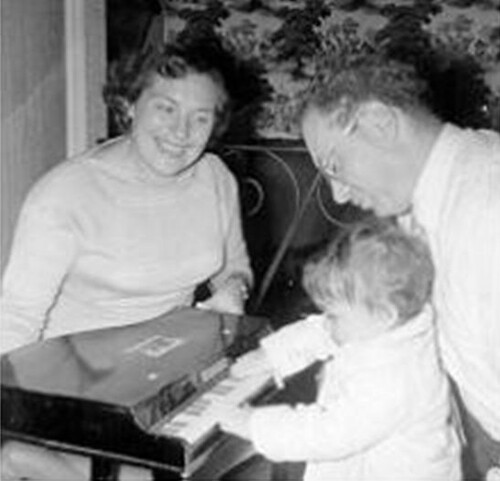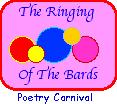Three Years Ago, Part 1 of 13

Brooklyn, year unknown. At some point our back yard lost its swing set and my father converted the space into a vegetable garden. There he grew chives, lettuce, cucumbers, zucchini, green peppers, and tomatoes.
This is my favorite photograph of him. He seemed truly happy and at peace when he was either gardening or playing the piano. My relationship to the piano is complex because my father had been my first teacher. In contrast, my gardening -- forged from Brooklyn memories -- carries with it a joyful simplicity.
On November 26, 2002, two days before Thanksgiving, my father committed suicide. This series presents journal excerpts from that time and the aftermath of his death, edited for privacy purposes and omitting numerous "to do" lists....
11/23/02 2:56 pm. In the [newly established] artists' studio on Humphreys Street. I have turned the heat on so that I can sit and write without my hands being cold. I wear my work clothes, and have just finished my latest installment of commissioned artwork. I shredded paper last night, and will put more up to soak before I leave.
I sit with a cup of green tea, having brought the coffee maker here -- and, on the CD player, Grant Still's music has seen me through the past 90 minutes or so.
5:49 pm. Schmoozed with fellow artists, taking a Grand Tour of all the studios. Later, the owner stopped by with a group of folks, to whom I gave a tour of my space. He was pleased -- able to show people that there was already a working artist in the space. He said that this had been the first room to receive baseboard heating, and as such had been a regular hangout for the workers.
Mostly, we hung out in my friend D's room and toasted the studio space with wine and munchies. D asked us each to paint on the wall. I'd given him a blank book as a housewarming gift -- he wants to do more writing.
He showed us work from his portfolios of 20 years ago. Beautiful stuff. "I was an artist then," he said. We assured him that he still is -- but I know what it's like to be separated from one's heart. He thought his work would end up killing him, didn't think he'd survive it. He was turning to survivor literature (and in some cases those who had not survived, like Etty Hillesum) because he could identify, on a certain level, with that kind of suffering. His days had gone from 5 am to 8 pm, fairly unchanging through the week.
We were having extraordinary exchanges of ideas -- on art, printmaking, photography. He showed us wonderful books of photos. Another artist with us, a printmaker and photographer, told stories about the people portrayed in the books. One man had died in a cold Parisian room, after he'd made it his mission to capture Paris on film. He'd died in poverty. An American woman, a photographer herself, had found a collection of his plates, bought them, brought them to the States, and saved his art before it was destroyed.
My father had asked, this morning, "Do you like what you're doing?"
I asked, "All of it, or a specific part?" Then I said, "I enjoy the creative work. Everything else is window dressing."
He has not been feeling well. He's in a lot of pain, pops a lot of aspirin. He'd taken a bad fall a couple of weeks ago -- doesn't think he broke anything but of course refuses to see a doctor. His pain subsides as the day progresses, but he's been waking up in pain. His voice sounded a bit slurred on the phone and at times I wondered if he understood what I was saying. Our conversation was quite short.
That, and his question to me, makes me wonder if he'll live to see 85.

Brooklyn, 1959. I am about a year old. Before my mother lost her singing voice to cigarettes and yelling, she would stand at the piano (not the one in this photo), singing while my father played. I remember being enthralled, when I was very young, at her rendition of George and Ira Gershwin's "Summertime".
When I was a toddler I was plinking out "The Chicken Song" on the piano with one finger. I'd given the name to one of the faster themes in Franz Liszt's Hungarian Rhapsody because it had accompanied a frantic chicken on a Saturday morning cartoon.
Being able to play by ear was a mixed blessing. It let me get away with being a terrible sight-reader because I could memorize music very easily. My father wouldn't tolerate it, scowling when I entertained my friends by playing Hit Parade songs. Decades later, when he and I had a chance to forge a closer bond, he confessed to me that he, too, had been a terrible sight-reader. He'd improved his skill, forced to keep up with his own piano teacher -- his mother -- who played a composition with one hand while he had played it with the other.
Postscript:As I scanned photographs of my father for this series earlier tonight, my radio began to play Serge Rachmaninoff's Piano Concerto No. 3. Macedonian pianist Simon Trpceski was the soloist. Gianandrea Noseda conducted the New York Philharmonic.
The New York Philharmonic was my "home orchestra" and my father's; both of us had been born in Brooklyn. Rachmaninoff had been my father's favorite composer -- the only composer whose portrait he displayed. My father had concertized in his youth and taught piano, organ, and accordion.
On the radio, Trpceski dedicated his performance to his father.
Sometimes the Universe has a way of falling beautifully into place.











2 Comments:
Wow. Elissa, what an opening. I'm looking forward to the rest. Since you say "1 of 13" I assume you've already written the rest?
Yep -- These are all excerpts from past journal entries on which I've done minor edits. Once I collected the excerpts together I divided them according to what I thought were logical break-points.
Thanks for reading, and for the feedback!
Post a Comment
<< Home